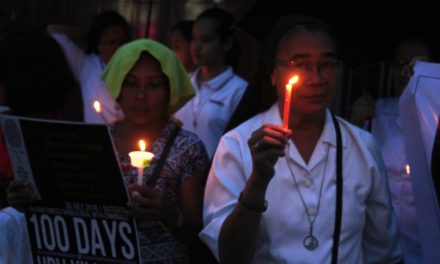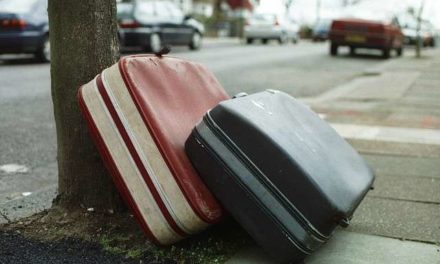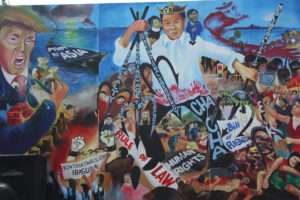
Papa Digong, A Fascist Original. International Workers’ Day Mobilization. 2017 May 1. Mural by Alex Uy. Photo by Galileo de Guzman Castillo.
As the midterm elections near, three features of the electoral landscape have emerged. First, the administration slate, Hugpong ng Pagbabago, has projected as its main plank the loyalty of its candidates to the president. Second, the elite opposition is in a defensive mood. Third, much of labor has come together in an electoral coalition on an issues-based campaign, a signal achievement that might portend a more strategic alliance.
The Electoral Landscape
First, the administration coalition is running not on issues but on the coattails of a popular president. Their message: elect us so we can help Papa Digong carry out his mandate. Probably reflecting the lack of a coherent program, the Hugpong candidates have so far refused to participate in an official debate with the opposition Otso Diretso, leaving it up to the networks to tease out their stands on various issues by arranging televised debates. More than the individual candidates of Hugpong, Sara Duterte, the president’s daughter, has emerged as the dominant personality in the administration’s campaign. Her message that it’s loyalty to the president, not issues or even character that counts, came through loud and clear in her brazen statement that honesty was not an important trait in a candidate.
Second, the opposition Otso Diretso has evinced mainly a defensive posture, conceding from the very beginning that it was going to be difficult to win against the candidates of a popular president. A spokesman for the Liberal Party, the axis of the slates, has also said that the election campaign would be a way to consult people on how the party failed the people when it was in power during the previous administration. Perhaps the most striking sign of its timidity was its avoiding the color yellow, long the color associated with the EDSA Revolution and the Liberal Party, because Duterte partisans have successfully associated yellow with unfulfilled promises, ineffectiveness, elitism, and hypocrisy. Another indication of lack of confidence has been the much-noted reluctance of Mar Roxas, the opposition’s leading candidate, to campaign in the company of the other seven. Roxas’ approach has been to downplay criticism of Duterte while highlighting his credentials as an “economist” who can work with the president.
Third, there is a ray of light in this dismal picture, and that is the formation of an alliance called “Labor Win” that brings together candidates representing some of the country’s major labor federations. The united electoral front, which was unplanned but came together as the campaign progressed, was in itself a major achievement, given the fractious state of Philippine labor. More importantly, it sought to introduce into the electoral fray a campaign based on the gut issues felt by the electorate, among them poverty, inequality, corruption, poor public services, and environmental degradation. This is not to say that the labor candidates agree on all key points; indeed, some are said to have ambiguous positions toward Duterte. Except for one, the candidates are not well known to the public, but their performance in television debates and interviews has struck many as quite credible because all are veterans of mass struggles.
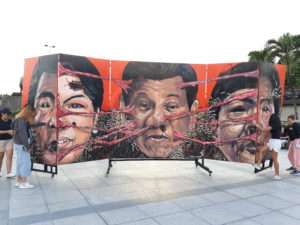
The Wall of Damnation.The MAD (Marcos-Arroyo-Duterte) Triumvirate. United Peoples’ Action Against Dictatorship. Manila Philippines. 2018 September 21. Mural by Ugat Lahi Artist Collective. Photo by Galileo de Guzman Castillo.
The Conjuncture
The midterm elections come at very critical conjuncture. Over the last three years, Duterte has taken major steps towards authoritarian rule. Thousands of people have died at the hands of the police and vigilantes in the war on drugs, and the president’s response to critics is that the campaign will become even more vicious. The US-style separation of powers has broken down, with Congress fully controlled by his allies and the Supreme Court purged of a chief justice that Duterte considered one of his top enemies. One third of the country, Mindanao, is under martial law. Duterte’s most vocal opponent, Senator Leila de Lima is in jail on fabricated or legally flimsy charges. Most of the press is in self-censorship mode. The one possible source of opposition that could give him pause is the military, but he has done his homework on this front, giving many top cabinet positions to former generals while winning the support of enlisted men with his tough-guy charisma. Senator Sonny Trillanes, one of his top critics, has admitted that majority of the rank and file in the Armed Forces of the Philippines (AFP) support Duterte.
The problem that the opposition faces is that Duterte remains very popular. Duterte’s approval, trust, and satisfaction ratings remain rather high at 76 percent, 81 percent and 74 percent in the last quarter of 2018, respectively. The polls also showed that the majority also support his war on drugs, despite the horrendous statistics on extra-judicial killings (EJKs). It is this seeming invincibility in the court of public opinion that has made the elite opposition wary of a strong frontal assault on Duterte on the human rights front, fearing the Duterte partisans’ counterattack that critics are more concerned about the rights of criminals than the rights of victims. This defense has proven very effective, especially among the middle class.
The Issues
This is not, however, an excuse not to press the administration on the issue of EJKs aggressively. Neither must it be let off the hook on other issues. This issue of the Focus Policy Review explores these issues and assesses how the Duterte administration responded to each of them through its policies and action points. These responses, which in a nutshell are very neoliberal and authoritarian, fall under Duterte’s promised change at the beginning of his presidency. Thus, the underpinning question of the assessment that is directed to the electorate is this: “Is Duterte’s promised change still the change we want to pursue?”
As an alternative to Duterte’s neoliberal and authoritarian response, Focus on the Global South puts forward a progressive peoples’ agenda. In addition, the report also presents some of the candidates’ stands on these issues. With the dissemination of its analysis, Focus hopes that the progressive peoples’ agenda as well as the candidates’ stands on key issues will serve as the criterion that voters will use to choose among them, especially in the contest for the Senate.
Leading off the report is Bianca Martinez’ dissection of the proposed shift to federalism, one of the key campaign promises of Duterte in 2016 that is now incarnated in Resolution of Both Houses 15, or simply RBH 15, the main author of which is House Speaker Gloria Macapagal Arroyo. Martinez argues that federalism diverts our attention from the real solutions to the country’s problems, foremost of which are the dynastic control of politics and the neoliberal paradigm that has weakened the economy, failed to bring down poverty, and brought about unprecedented levels of inequality. As currently proposed, Martinez says, federalism will simply strengthen dynastic control at the local level while making communities more permeable to exploitation by big business, like mining corporations.
The economy has turned out to be the administration’s biggest headache. Focus Philippine Office Head Joseph Purugganan dissects the problem of inflation, which in 2018 rose to levels not seen in over a decade. This triggered a blame game among Duterte’s technocrats, but it was clear that the new Tax Reform for Acceleration and Inclusion (TRAIN) law, which imposed an excise tax of 2.50 on a liter of oil, was a major culprit. However, from a longer term perspective, Purugganan claims that inflation in food commodities must be seen as largely rooted in the state of agriculture, the productivity of which has stagnated over the last four decades. Lack of government support and the elimination of quotas on imports have led to a supply crisis amidst great demand.This crisis will deepen owing to the elimination of the quota on rice imports by the Rice Tariffication Act, a longstanding demand of the World Trade Organization (WTO). In this connection, Purugganan does not fail to point out that the president—who, as candidate, Duterte denounced the drive of the WTO to open up Philippine agriculture to cheap imports as the source of the crisis of agriculture—was the one who signed the Rice Tariffication Bill into law.
As the government resorts to importation to stabilize market prices and attain food security, small food producers find themselves at the bottom of the government’s development agenda as they struggle to survive in a fading countryside. Raphael Baladad, in his conversation with sectoral leaders, argues that “under the current state of things, there will be no systemic responses to address the ills of the countryside, since Duterte has already eroded the spaces where reforms can be demanded by the people.” The survival of the countryside under Duterte’s neoliberal economy rests on alternatives and promoting community expressions of resistance in the face of worsening economic and climate conditions.
Environmental degradation is high on the list of concerns of Filipinos according to surveys, yet the record of the administration in this area leaves much to be desired, according to Galileo de Guzman Castillo. Duterte campaigned on an anti-mining platform but he allowed the powerful mining lobby to derail the confirmation of Department of Environment and Natural Resources (DENR) Secretary Gina Lopez when she moved to impose serious curbs on their mining operations. In recent months, much attention has been paid to Duterte’s environmental initiatives, which have focused on cleaning up Boracay and Manila Bay. Castillo points out that his approach is problematic. It has been typically authoritarian, imposing a plan from above that is carried out in military fashion by ex-military men in his cabinet. There is no consultation of the affected communities, who have to bear many of the costs of these much-touted clean-ups.
It is true that that many environment-related problems that reached crisis proportions in the last three years have existed prior to Duterte. Notable among these is the water crisis, which broke out in early March, resulting in the cutting off or rationing of water in areas of Manila serviced by the Manila Water. In true Duterte fashion, the president gave the water bureaucracy a deadline to solve the problem. But Castillo contends that it is unlikely that the water issue can be addressed with a simple presidential command since the root cause, as the candidates of Labor Win have pointed out, is the privatization of water supply and delivery that took place in the early nineties, under then President Fidel Ramos. Like many economic and environmental crises that have challenged his administration, the culprit is largely the neoliberal framework that Duterte inherited from his predecessors and the strategic solution is to reverse and dismantle it. However, it is unlikely that Duterte will break from this framework since he has given his neoliberal technocrats—namely Finance Secretary Carlos Dominguez, National Economic Development Authority chief Ernesto Pernia, and Budget Secretary Ben Diokno— free rein when it comes to economy policymaking, on the grounds that he does not understand economics.
Furthermore, another important reason for the persistence of the neoliberal framework is Filipinos’ general skepticism towards the state’s takeover or regulation of the economy due to the widespread public perception of the state as being irredeemably corrupt and incompetent. However, as Baladad notes, the Duterte administration has attempted to change this perception through its highly publicized crackdown on corrupt officials. Yet beneath the glorified achievements of Duterte’s anticorruption campaign, his “controversial reappointment of corrupt officials, tendency to detach inner circles from administrative and criminal liabilities following accusations of dishonesty,” and attack on “democratic institutions that supposedly safeguard the public from powerful and influential politicians who scramble to amass more wealth” have all served to delegitimize Duterte’s resolve to end pervasive corruption.
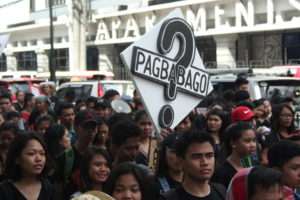
Change? (for what, for whom?) Bonifacio Day Mobililzations. Manila, Philippines. 2016 November 30. Photo by Galileo de Guzman Castillo
Human rights is another institution that has been assailed and demonized by the Duterte administration. As pointed out in Purugganan’s article on democracy and human rights however, the progressive agenda should necessarily address not just the rising death toll from the government’s violent war on drugs, but also concerns over the continuing failure of the government to protect and promote economic, social, and cultural rights towards ensuring a life of dignity for all. In this regard, the efforts of progressive groups to engage the electoral process, whether by directly fielding and supporting progressive candidates who would push back Duterte’s autoritarian agenda, and advance human rights-based policies and governance, or by putting the spotlight on key peoples concerns and issues, are seen as important steps towards stopping the democratic decline.
Closely connected to the issue of human rights is that of women’s rights. Under the Duterte administration, the situation of women has become even more difficult as the president’s misogynistic and sexist remarks, his administration’s neoliberal agenda, and his despotic and patriarchal style of governance have all worked together to disrespect and disparage women, contain them in spaces where they can easily be controlled, and systematically deprive poor women of opportunities and resources that would have allowed them to transcend conditions of poverty. However, in women’s struggle for emancipation, it is important to always bear in mind that the continuing oppression and marginalization of women cannot be attributed to Duterte alone, for his power and legitimacy stems from the larger patriarchal system that we have blindingly allowed to endure and shape our values for centuries. Therefore, as Martinez says in the synthesis of her conversations with women’s rights activists, we need to strengthen “the women’s movement by molding younger women’s rights activists and immersing ourselves in the lives of women from the grassroots in order to raise their awareness of the oppressive conditions endured by the sector, understand their struggle, and forge strong and lasting comradeships towards the common goal of emancipating women” as ways forward for women within a patriarchal society that is buttressed by a misogynist, authoritarian, and neoliberal administration.
Mindanao is Duterte’s home base and it is likely that Hugpong will sweep the area. However, there are major problems in Duterte’s approach to securing the much longed for peace that voters should be aware of, Castillo writes in his second contribution, a wide-ranging interview with civil society leaders. It is principally a military solution, as exemplified in what has now become an indefinite extension of martial law over the island. With the focus on the continued militarization of the area, the much ballyhooed rehabilitation of Marawi, which was destroyed by the five-month battle for the city, has been effectively relegated to the backburner, creating much anger and discontent, especially among the youth, who had been the source of recruits for the Maute rebel group that took over the city.
Castillo notes, however, that many Mindanaoans, especially Muslims, are pinning their future on the Bangsa Moro Autonomous Region that was recently approved in a plebiscite. People are hoping that there will in fact be real autonomy, that the Moro Islamic Liberation Front (MILF) that was the principal insurgent group behind the establishment of the new entity will be open to real cooperation with other forces, that the rights of the non- Moro indigenous people or Lumad will be respected, and that local dynasties will not end up controlling politics. To many concerned citizens, electing the right people in the May elections is critical since they will greatly influence the development of the new political entity.
The Lessons of Turkey
As election day approaches, it is imperative that the candidates opposing the administration not be daunted by the president’s popularity and indefatigably and aggressively push a campaign based on issues that Duterte has not addressed or addressed in the wrong fashion. One of the shortcomings of democracy is that it sometimes allows anti-democratic personalities to come to power owing to their momentary appeal to the masses. But one of the strengths of democracy is that it is also the most effective way of throwing out those who have betrayed the public trust. Duterte has betrayed the public trust, but it is our duty to open the people’s eyes to that.
In this regard, we should take heart from the recent elections in Turkey, where the opposition pried the key cities of Izmir, Istanbul, and Ankara from the grip of the strongman Recep Tayyip Erdoğan, to the great surprise of almost everyone. Trust the people, for as Lincoln put it, “You can fool all the people some of the time, and some of the people all the time, but you cannot fool all the people all the time.” W. Bello with contributions from FPR Team

